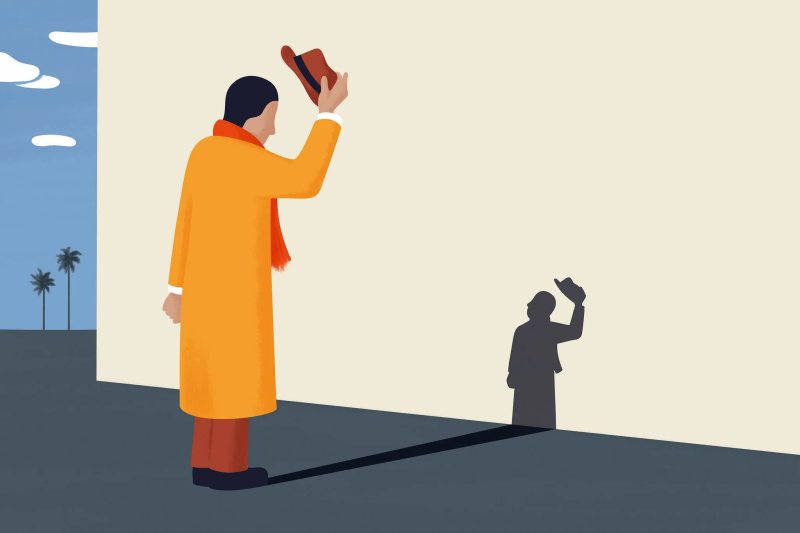
研究发现,谦逊虽非最突出的性格特质,却是至关重要的一项,且难以伪装。
心理学研究者日常工作无需防护眼镜,更不必戴探险头盔或挥舞印第安纳琼斯式的皮鞭。他们既不垂降洞穴发掘古卷,也不驾驶球形潜艇巡游海底,更不会调试地下巨型磁铁追寻幽灵般的亚原子粒子。
然而心理学家确实偶尔会发掘失落文明的习性。在最新一期《心理科学前沿》发表的论文中,研究团队梳理了关于一种曾广泛存在的个人特质的研究,其特征在于“能够准确认知自身局限与能力,并采取以他人为中心而非自我为中心的人际立场”——即谦逊。
密歇根州霍普学院心理学家、论文第一作者达里尔·范·通格伦指出:“谦逊研究正迅猛发展,是时候更新认知框架,梳理开放性问题以指引后续研究。”
在这个未来史学家未必会冠以“仁者时代”的年代,研究谦逊无异于大胆的逆势押注——如同做空加州大麻市场。如今“谦逊”一词常被用作动词,而践行其温和精神的形容词形态,却可能招致网络喷子攻击、职业隐形甚至更糟的后果。奥斯卡·王尔德曾写道,在领悟谦逊之前,他历经两年牢狱之灾,体会到“痛哭流涕的痛苦”与“无声的悲惨”——这更像是失败而非胜利。
谦逊在社会心理学与人格心理学领域尚属新秀,至少作为独立研究的特质或行为是如此。它始于1990年代构建“积极心理学”的尝试——旨在更全面地理解自豪、宽恕、坚韧与满足等维系人格的品质。近年谦逊特质已在最广泛应用的人格测评工具——五因素问卷中占据一席之地。这位“墙花”正吸引着关注,且似乎正从容吸收着这些目光。
佩珀代因大学的伊丽莎白·克鲁姆雷·曼库索通过系列实验,以“智力谦逊”为标准对志愿者进行评分——即对其在政治社会议题上认知不完整性与易错性的自觉程度。她发现,这种谦逊与智商或政治立场无关,却与好奇心、反思能力及开放心态密切相关。
在另一项持续进行的研究中,克鲁姆雷·曼库索博士让587名美国成年人填写了测量知识谦逊程度的问卷。参与者需对多项陈述进行认同度评分,例如“当他人反对我珍视的观点时,我会感到渺小”、“总体而言他人能从我身上学到的远多于我能从他们身上学到的”。谦逊度得分较高者(他们不会因此自夸)在政治意识形态极化程度(无论保守派或自由派)的测评中得分较低。
其他研究发现,谦逊度高者相较于谦逊度低者,在面对其他宗教群体成员时更少表现出攻击性和评判性——尤其当自身宗教观点受到质疑时。
克鲁姆雷·曼库索博士指出:“这些发现或许能解释为何高智力谦逊者不易被操纵观点。”她补充道,该研究还“有助于理解谦逊如何与坚定信念相辅相成”。
在最新综述论文中,范通根博士及其团队提出若干解释:为何谦逊(无论智力层面或其他层面)成为人格中如此珍贵的特质。谦逊的处世态度对维系稳定关系至关重要,更广泛而言它能滋养心理健康——提供摆脱怨恨、包容愚者、宽恕自我的心理资源。
范通格伦博士指出,随着谦逊成为研究焦点,诸多问题亟待解答:谦逊能否通过教学培养?能否融入心理治疗?“棘手之处在于,最愿意培养谦逊的人往往最不需要它,”他表示,“反之亦然:最需要谦逊的人可能最抗拒它。”
治疗边缘型或自恋型人格障碍的心理医生对此深有体会,他们的许多患者亦然。
迄今无人深入探讨谦逊的阴暗面,但过度谦逊可能导致社交退缩、自我怀疑与过度沉默。在这个网络炫耀与自我推销的时代,查理·布朗恐怕得举手高声嚷嚷才能彰显存在感。
不过,得益于心理学界近期的研究发掘,我们至少可以确信:从气质层面而言,他绝非孤身一人。根据不同评分标准,10%至15%的成年人在谦逊度测试中得分较高。仅在美国,谦逊人群就至少有两千五百万之众。
谁能想到呢?
Be Humble, and Proudly, Psychologists Say
Humility is not the boldest of personality traits, but it’s an important one, studies find. And it’s hard to fake.
In their day jobs, research psychologists don’t typically need safety goggles, much less pith helmets or Indiana Jones bullwhips. There’s no rappelling into caves to uncover buried scrolls, no prowling the ocean floor in spherical subs, no tuning of immense, underground magnets in the hunt for ghostly subatomic particles.
Still, psychologists do occasionally excavate the habits of lost civilizations. In a paper published in the latest issue of Current Directions in Psychological Science, a team of researchers reviewed studies of a once-widespread personal trait, one “characterized by an ability to accurately acknowledge one’s limitations and abilities, and an interpersonal stance that is other-oriented rather than self-focused.” Humility.
“Research on humility has been growing, and fast,” said Daryl Van Tongeren, a psychologist at Hope College in Michigan and lead author of the new paper. “It was time to bring people up-to-date and lay out the open questions to guide further research.”
In an era that future historians might not immediately label “The Age of the Mensch,” the study of humility amounts to a bold contrary bet, like shorting the California cannabis market. The word “humble” travels so often now as a verb that embodying its gentler spirit, the adjective, can be an invitation to online trolling, professional invisibility or worse. Oscar Wilde wrote that, before he found humility, he spent two years behind bars experiencing “anguish that wept aloud” and “misery that could find no voice” — which sounds more like defeat than victory.
Humility is a relative newcomer to social and personality psychology, at least as a trait or behavior to be studied on its own. It arrived as part of the effort, beginning in the 1990s, to build a “positive” psychology: a more complete understanding of sustaining qualities such as pride, forgiveness, grit and contentment. More recently, humility has found a foothold in the most widely used measure of personality traits, the five- factor questionnaire. The wallflower is attracting some attention, and so far appears to be absorbing it well.
In one series of experiments, Elizabeth Krumrei Mancuso of Pepperdine University scored volunteers on a measure of what she called intellectual humility — an awareness of how incomplete and fallible their views on political and social issues were. This kind of humility was not related to I.Q. measures or political affiliation, she found; it was strongly linked to curiosity, reflection and open-mindedness.
In another, ongoing study, Dr. Krumrei Mancuso had 587 American adults complete questionnaires intended to measure levels of intellectual humility. The participants rated how much they agreed with various statements, including “I feel small when others disagree with me on topics that are close to my heart,” and “For the most part, others have more to learn from me than I have to learn from them.” Those who scored highly on humility — not that they’d boast about it — also scored lower on measures of political and ideological polarization, whether conservative or liberal.
Other research has found that people who score high for humility are less aggressive and less judgmental toward members of other religious groups than are less-humble people, even and especially after being challenged about their own religious views.
“These kinds of findings may account for the fact that people high in intellectual humility are not easily manipulated with regard to their views,” Dr. Krumrei Mancuso said. The findings, she added, may also “help us understand how humility can be associated with holding convictions.”
In the new review paper, Dr. Van Tongeren and his colleagues proposed several explanations for why humility, intellectual or otherwise, is such a valuable facet of personality. A humble disposition can be critical to sustaining a committed relationship. It may also nourish mental health more broadly, providing a psychological resource to shake off grudges, suffer fools patiently and forgive oneself.
Now that humility is attracting some research attention, Dr. Van Tongeren said, there are a number of open questions, including whether it can somehow be taught, or perhaps integrated into psychotherapy. “One of the thorny issues is that the people who are the most open and willing cultivate humility might be the ones who need it the least,” he said. “And vice versa: Those most in need could be the most resistant.”
Therapists who treat people with borderline or narcissistic personality disorders likely would agree, and so might many of their clients.
To date, no one has elaborated a dark side to humility, although presumably too much of it could lead to social retreat, self-doubt and undue reticence. In the modern age of online posturing and self-promotion, Charlie Brown would have to raise his hand and squawk just to register his presence.
For now, and thanks to psychology’s recent excavations, it is perhaps enough to know that he would still have plenty of company, temperamentally speaking. Between 10 and 15 percent of adults score highly on measures of humility, depending on the rating scale used. That’s at least 25 million humble people in this country alone.
Who knew?
